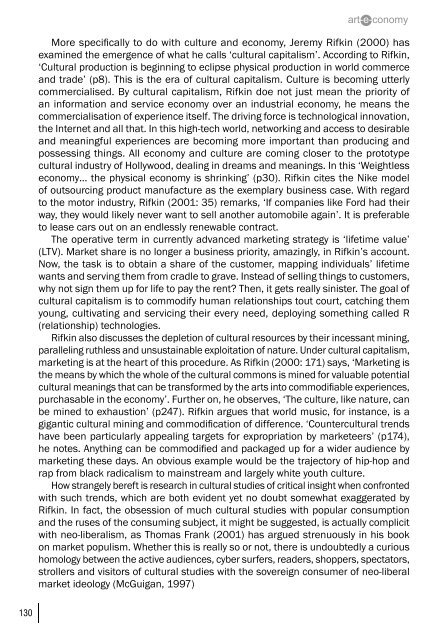art-e-conomy _ reader - marko stamenkovic
art-e-conomy _ reader - marko stamenkovic
art-e-conomy _ reader - marko stamenkovic
You also want an ePaper? Increase the reach of your titles
YUMPU automatically turns print PDFs into web optimized ePapers that Google loves.
130<br />
More specifically to do with culture and e<strong>conomy</strong>, Jeremy Rifkin (2000) has<br />
examined the emergence of what he calls ‘cultural capitalism’. According to Rifkin,<br />
‘Cultural production is beginning to eclipse physical production in world commerce<br />
and trade’ (p8). This is the era of cultural capitalism. Culture is becoming utterly<br />
commercialised. By cultural capitalism, Rifkin doe not just mean the priority of<br />
an information and service e<strong>conomy</strong> over an industrial e<strong>conomy</strong>, he means the<br />
commercialisation of experience itself. The driving force is technological innovation,<br />
the Internet and all that. In this high-tech world, networking and access to desirable<br />
and meaningful experiences are becoming more important than producing and<br />
possessing things. All e<strong>conomy</strong> and culture are coming closer to the prototype<br />
cultural industry of Hollywood, dealing in dreams and meanings. In this ‘Weightless<br />
e<strong>conomy</strong>… the physical e<strong>conomy</strong> is shrinking’ (p30). Rifkin cites the Nike model<br />
of outsourcing product manufacture as the exemplary business case. With regard<br />
to the motor industry, Rifkin (2001: 35) remarks, ‘If companies like Ford had their<br />
way, they would likely never want to sell another automobile again’. It is preferable<br />
to lease cars out on an endlessly renewable contract.<br />
The operative term in currently advanced marketing strategy is ‘lifetime value’<br />
(LTV). Market share is no longer a business priority, amazingly, in Rifkin’s account.<br />
Now, the task is to obtain a share of the customer, mapping individuals’ lifetime<br />
wants and serving them from cradle to grave. Instead of selling things to customers,<br />
why not sign them up for life to pay the rent? Then, it gets really sinister. The goal of<br />
cultural capitalism is to commodify human relationships tout court, catching them<br />
young, cultivating and servicing their every need, deploying something called R<br />
(relationship) technologies.<br />
Rifkin also discusses the depletion of cultural resources by their incessant mining,<br />
paralleling ruthless and unsustainable exploitation of nature. Under cultural capitalism,<br />
marketing is at the he<strong>art</strong> of this procedure. As Rifkin (2000: 171) says, ‘Marketing is<br />
the means by which the whole of the cultural commons is mined for valuable potential<br />
cultural meanings that can be transformed by the <strong>art</strong>s into commodifiable experiences,<br />
purchasable in the e<strong>conomy</strong>’. Further on, he observes, ‘The culture, like nature, can<br />
be mined to exhaustion’ (p247). Rifkin argues that world music, for instance, is a<br />
gigantic cultural mining and commodification of difference. ‘Countercultural trends<br />
have been p<strong>art</strong>icularly appealing targets for expropriation by marketeers’ (p174),<br />
he notes. Anything can be commodified and packaged up for a wider audience by<br />
marketing these days. An obvious example would be the trajectory of hip-hop and<br />
rap from black radicalism to mainstream and largely white youth culture.<br />
How strangely bereft is research in cultural studies of critical insight when confronted<br />
with such trends, which are both evident yet no doubt somewhat exaggerated by<br />
Rifkin. In fact, the obsession of much cultural studies with popular consumption<br />
and the ruses of the consuming subject, it might be suggested, is actually complicit<br />
with neo-liberalism, as Thomas Frank (2001) has argued strenuously in his book<br />
on market populism. Whether this is really so or not, there is undoubtedly a curious<br />
homology between the active audiences, cyber surfers, <strong>reader</strong>s, shoppers, spectators,<br />
strollers and visitors of cultural studies with the sovereign consumer of neo-liberal<br />
market ideology (McGuigan, 1997)


